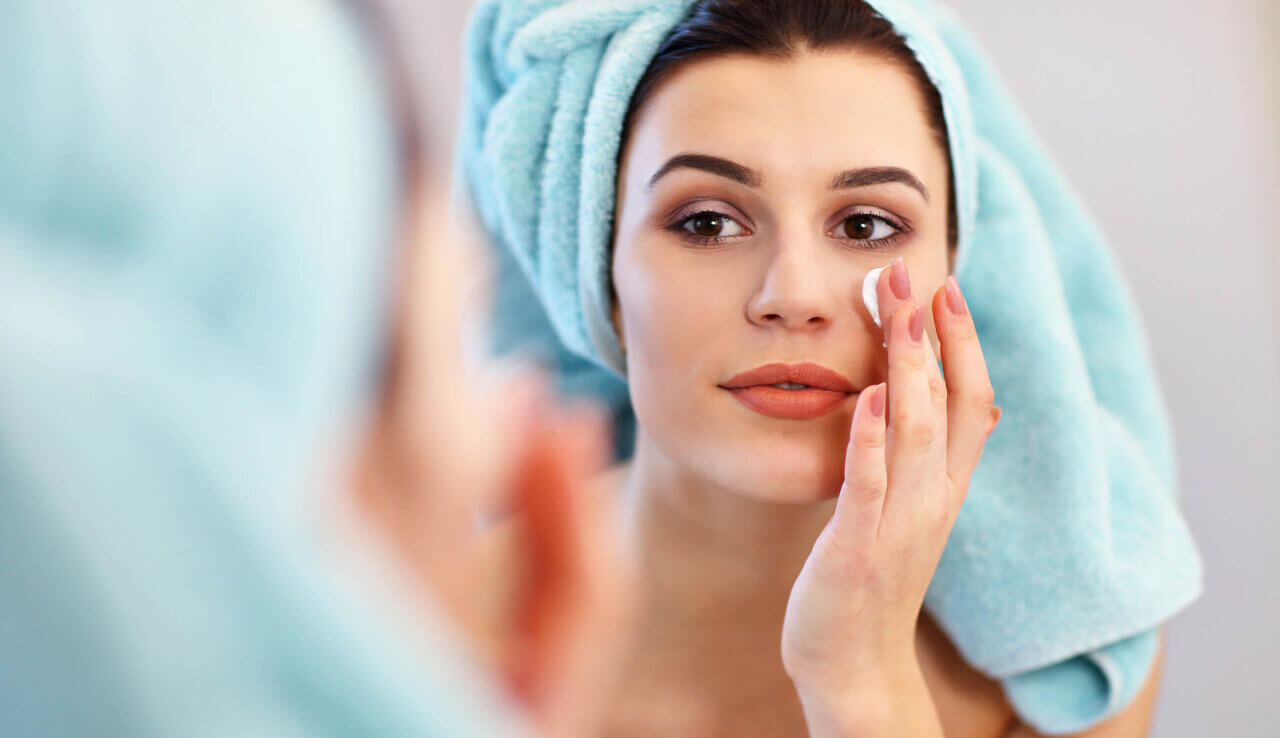Does the thought of adding more moisture to your already oily skin make you want to run for the hills? You’re not alone. Here’s what might surprise you: skipping moisturizer could be the exact reason your skin produces even more oil than it should.
The truth is, your skin might be stuck in a vicious cycle. When it’s dehydrated (yes, oily skin can be dehydrated too), it overcompensates by pumping out more sebum to protect itself. The result? That frustrating combination of oily patches, clogged pores, and somehow still feeling tight or uncomfortable.
But here’s the good news: proper hydration is essential for maintaining a healthy skin barrier and preventing the skin from overproducing oil, according to master aesthetician Edyta Jarosz. The key isn’t avoiding moisture—it’s finding the right type that works with your skin, not against it.
Why Your Oily Skin Actually Craves Moisture (The Science Behind the Madness)
Let’s get one thing straight right away. Oily doesn’t mean hydrated. Think of it like this: your skin has two different needs that often get confused. Oil (sebum) is what your sebaceous glands produce to protect your skin. Hydration is water content that keeps your skin cells plump and healthy.
When your skin barrier is compromised—whether from over-cleansing, harsh products, or environmental stress—it sends out an SOS signal. Your oil glands get the message that something’s wrong and start working overtime. Meanwhile, your skin might actually be parched for water-based hydration.
Recent dermatological research shows that the best moisturizers for oily skin have a lightweight formula with noncomedogenic ingredients that provide moisture without clogging pores. This means you can give your skin what it needs without triggering more breakouts or that dreaded greasy feeling.
Find Your Perfect Moisturizer Match
Answer a few quick questions to get personalized recommendations:
Question 1: How does your skin feel 2-3 hours after cleansing (without any products)?
Question 2: How often do you deal with breakouts?
Question 3: What’s your biggest skin concern right now?
Your Recommended Moisturizer Type:
The 8 Best Moisturizers for Oily Skin (Actually Tested, Not Just Hyped)
After analyzing dozens of formulas and reading through hundreds of real user reviews, here are the moisturizers that consistently deliver results without the grease:
Best Overall: Tatcha The Water Cream
Why it works: This lightweight, oil-free formula uses Japanese botanicals to control excess oil while providing serious hydration. The texture is almost gel-like, absorbing instantly without any sticky residue.
✅ Pros
- Mattifies skin even on oily days
- Contains anti-inflammatory Japanese wild rose
- Small amount goes a long way
- Great for sensitive oily skin
❌ Cons
- Higher price point ($72)
- Bulky packaging for travel
- May not provide enough hydration in winter
Best Budget Pick: Neutrogena Oil-Free Acne Moisturizer
Why it works: At under $15, this drugstore hero combines salicylic acid with lightweight hydration. It’s like getting treatment and moisture in one step—perfect for acne-prone oily skin.
Best for Sensitive Oily Skin: La Roche-Posay Toleriane Double Repair Matte
Why it works: Dermatologist-recommended with ceramides and niacinamide, this formula repairs your skin barrier while controlling oil. The matte finish happens fast but doesn’t feel drying.
⚡ Best Fast-Absorbing: Paula’s Choice Invisible Finish Moisture Gel
Why it works: Lives up to its “invisible” name—you’ll forget you’re wearing moisturizer. Contains niacinamide to minimize pore appearance and control oil production.
Best Gel Formula: Caudalie Vinopure Moisturizing Mattifying Fluid
Why it works: This weightless gel melts into skin immediately, providing hydration without any heaviness. Grape seed polyphenols offer antioxidant protection while controlling shine.
Best for Morning Routine: Innisfree Green Tea Hyaluronic Acid Moisturizer
Why it works: Green tea provides antioxidant protection from daily environmental stress, while hyaluronic acid delivers lightweight hydration that lasts all day.
Best Splurge: SkinCeuticals Triple Lipid Restore
Why it works: Perfect for combination skin, this formula uses a precise ratio of ceramides, cholesterol, and fatty acids to restore your skin’s natural barrier without overwhelming oily areas.
Best Multitasker: Laura Mercier Tinted Moisturizer Natural Dewy SPF 30
Why it works: Combines lightweight coverage, hydration, and sun protection in one step. The hyaluronic acid provides moisture while the tint evens out your complexion naturally.
The Holy Grail Ingredients That Actually Work for Oily Skin
Not all moisturizer ingredients are created equal. Here’s what to look for (and what to avoid) when you’re shopping:
Hyaluronic Acid
What it does: Holds up to 1000 times its weight in water, providing intense hydration without heaviness.
Why oily skin loves it: Delivers moisture where you need it without adding oil or clogging pores.
Niacinamide
What it does: Regulates sebum production, reduces inflammation, and minimizes pore appearance.
Why oily skin loves it: Actually helps control the oil production that causes your skin concerns in the first place.
✨ Squalane
What it does: Mimics your skin’s natural sebum but in a lighter, non-comedogenic form.
Why oily skin loves it: Provides the protection your skin craves without triggering more oil production.
Salicylic Acid
What it does: Gently exfoliates inside pores to prevent clogs and breakouts.
Why oily skin loves it: Keeps pores clear while providing treatment benefits in your moisturizer step.
⚠️ Ingredients to Avoid Like Your Ex
These ingredients might seem moisturizing, but they’re likely to make your oily skin situation worse:
- Coconut Oil: Too heavy and comedogenic for most oily skin types
- Petroleum-Based Products: Can clog pores and feel suffocating
- Heavy Mineral Oils: Sit on top of skin rather than absorbing
- Alcohol-Heavy Formulas: Strip your skin, causing more oil production
How to Apply Moisturizer Like a Pro (Because Technique Matters)
Even the best moisturizer won’t work if you’re applying it wrong. Here’s the step-by-step method that actually works:
⏰ The 5-Minute Perfect Application Routine
Your skin should be slightly damp, not soaking wet or completely dry. This helps lock in hydration.
Seriously, less is more. Too much product can overwhelm oily skin and make it look greasy.
This helps the product spread more evenly and absorb better into your skin.
Gentle patting motions prevent irritation and help the product absorb rather than sliding around.
Give your moisturizer time to absorb before applying sunscreen or makeup.
Seasonal Strategies: Your Skin Changes, Your Moisturizer Should Too
Summer Approach: Stick with gel-based or ultra-lightweight formulas. Your skin produces more oil in heat and humidity, so less is definitely more. Consider switching to a mattifying moisturizer with oil-control ingredients.
Winter Reality Check: Even oily skin can get dehydrated in cold, dry air. You might need to layer a lightweight serum under your regular moisturizer, or switch to a slightly richer formula during the coldest months.
Transition Times: Spring and fall are perfect for reassessing your routine. Pay attention to how your skin feels and adjust accordingly—this is when you might discover your new holy grail product.
Common Mistakes That Keep Your Skin Oily (And How to Fix Them)
Mistake #1: Over-cleansing to “control oil”
This strips your skin and triggers more oil production. Stick to gentle cleansing twice daily max.
Mistake #2: Skipping moisturizer when breaking out
Your skin needs hydration to heal properly. Choose a non-comedogenic formula with acne-fighting ingredients instead.
Mistake #3: Using the same routine year-round
Your skin’s needs change with seasons, hormones, and life circumstances. Be flexible and adjust as needed.
Mistake #4: Expecting instant results
It takes 4-6 weeks for your skin to adjust to a new moisturizer and show real changes. Be patient and consistent.
Frequently Asked Questions (The Real Ones People Actually Ask)
Should I use moisturizer if my skin is already oily?
Absolutely yes. Moisturizer helps regulate oil production and prevents skin from overcompensating by producing more oil when it’s dehydrated, according to medical aesthetician Laila Fernando. Think of it as teaching your skin that it doesn’t need to work so hard.
How much moisturizer should I actually use?
A pea-sized amount for your entire face is plenty. Using too much can overwhelm oily skin and make it look shinier. If you need more coverage, apply a second thin layer rather than one thick one.
Can I use the same moisturizer morning and night?
Usually yes, but many people find they can handle slightly richer formulas at night when they’re not dealing with makeup or environmental stressors. Pay attention to how your skin responds.
What if my moisturizer makes me break out?
Give it 2-3 weeks unless you’re having a severe reaction. Sometimes skin needs time to adjust. If breakouts continue, switch to a formula with salicylic acid or niacinamide that treats while it moisturizes.
Is expensive always better for oily skin moisturizers?
Not necessarily. Some of the most effective formulas come from drugstore brands. Focus on ingredients and how your skin responds rather than price tags. A $15 moisturizer that works is infinitely better than a $150 one that doesn’t.
Your Next Steps: Building the Perfect Oily Skin Routine
Here’s the thing about finding your perfect moisturizer: it’s not just about the product itself. It’s about creating a routine that works with your lifestyle. Start with one of the recommendations above that fits your budget and concerns, then give it at least a month to work.
Pay attention to how your skin feels throughout the day, not just immediately after application. The best moisturizer for oily skin should leave you feeling comfortable and confident, whether you’re heading to a morning meeting or out for dinner.
Remember, your skin is unique. What works amazingly for your friend might not be right for you, and that’s completely normal. The key is being patient with the process and consistent with your routine.
Ready to finally make peace with moisturizer? Your skin has been waiting for this moment—and honestly, so has your confidence. Start with the quiz above to narrow down your options, then commit to giving your chosen formula a real chance to work its magic.
Your future self (with balanced, healthy-looking skin) will thank you for taking this step today.

